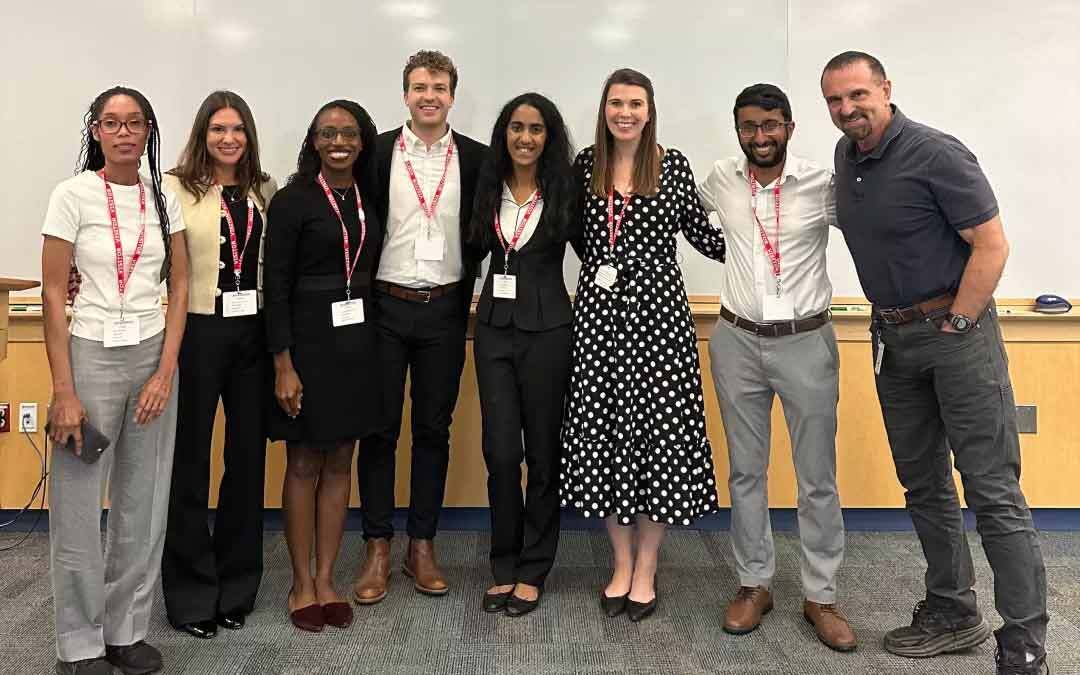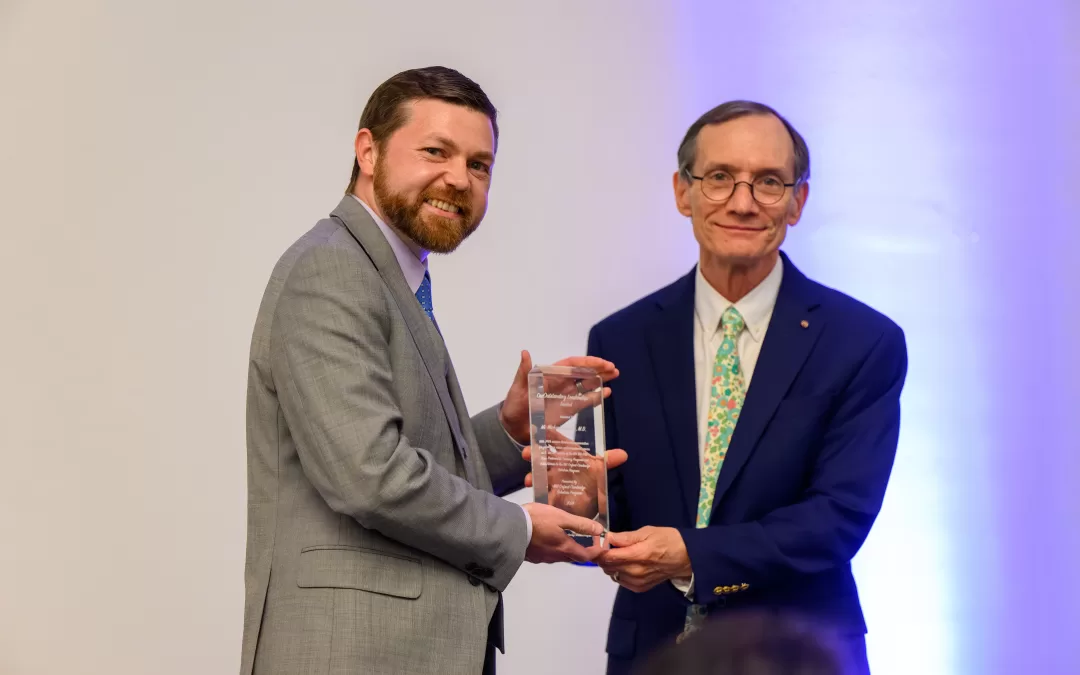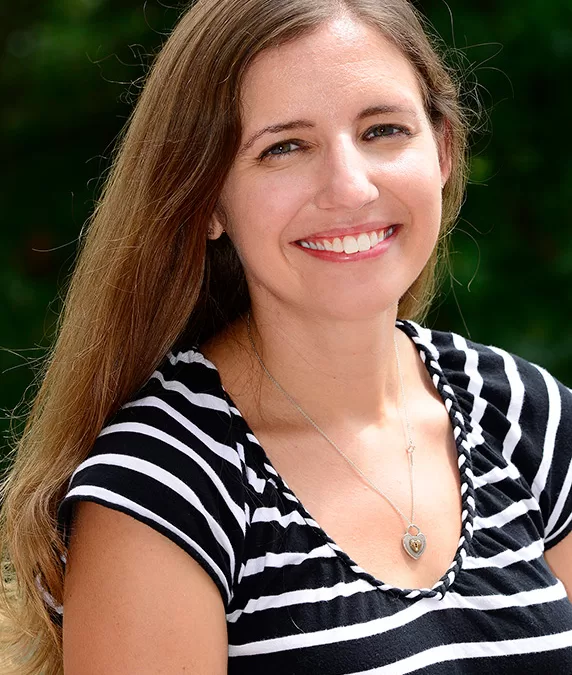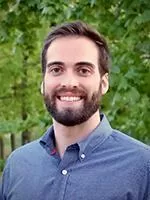
On September 26, 2024, the NIH Oxford-Cambridge Scholars and Alumni embarked on an enriching visit to Regeneron, fostering connections between future scientific leaders and established experts in biotechnology. Hosted at Regeneron’s headquarters, the visit featured a full day of discussions, presentations, and networking opportunities that highlighted the ongoing collaborative spirit between academic and industry research.
The day began with a warm welcome and light breakfast, followed by an introduction to Regeneron and its prestigious Postdoctoral Program by Susan Croll, Co-Director of the program, and Devon Southwick, Postdoctoral Program Coordinator. The Scholars had the chance to learn about cutting-edge research opportunities and career pathways at Regeneron.
Regeneron scientists Ido Rippon, Judith Altarejos, Chunguang Guo, Kalyani Nambiar, and David DiLillo presented their work in a series of engaging talks, offering insights into the research driving the company’s innovative efforts in immunology, genetics, neuroscience, and oncology.
Lunch provided an opportunity for informal discussions before transitioning into the afternoon agenda, which spotlighted Scholar-led initiatives. Anagha Krishnan, Hannah Dada, and Chiara Benetollo led a presentation on the “Science Unlocked” program. System-impacted youth, particularly in STEM, face poorer educational outcomes due to a lack of hands-on learning opportunities in prison curriculums, prompting the creation of “Science Unlocked”, a series of monthly science demonstrations at the Youth Services Center in DC. IBRA Director of Engagement and Events, Alexandra Ambrico, introduced IBRA’s mission, impact and reach, and their new network for international researchers.
A key highlight of the afternoon was the Scholars’ scientific presentations, where Anagha Krishnan, Hannah Dada, Sooraj Achar, and Henry Taylor shared their cutting edge research. Alumni Hannah Mason and Adjoa Smalls-Mantey discussed their research and careers. These sessions provided a platform for both Scholars and Alumni to showcase their work and engage in thought-provoking discussions with Regeneron scientists.
The day concluded with a closing reception, offering the group an opportunity to network with George Yancopoulos, Regeneron’s co-founder and Chief Scientific Officer, and other members of the Regeneron team.
This visit underscores the importance of collaboration between industry and academia in advancing biomedical research. Both Scholars and Regeneron scientists gained valuable insights, and the event highlighted the alignment of their scientific goals, particularly in the realms of biomedical innovation and education. We would like to extend our heartfelt thanks to Regeneron for their generous support and commitment, which has been instrumental in advancing our efforts to make a meaningful impact in supporting biomedical research leaders.

From time to time, individuals who have made extraordinary contributions to the NIH Oxford-Cambridge Scholars Program are singled out to receive special recognition with the “Director’s Award.” Honorees are selected based on their dedication to the mission of cultivating the next generation of scientists and their selfless service to the Scholars Program.
The 2024 Director’s Award was presented to Dr. Michael Lenardo.
Dr. Lenardo is not only an accomplished immunologist, having led his group to discover four distinct diseases and helped advance diagnostics and therapies for many more, but he is also a world-recognized international biomedical research leader. A AAAS Fellow, a Member of the National Academy of Science and the National Academy of Medicine, a Fellow of the Academy of Medical Sciences of Great Britain, and an Officer of the Most Excellent Order of the British Empire (O.B.E.) conferred by Queen Elizabeth II, he remains a trailblazer in immunology and biomedical research, as well as an incredible mentor and supporter of trainees at the NIH and collaborating universities.
Dr. Lenardo co-founded the NIH-Oxford Cambridge Scholars Program, the NIH-UPenn Immunology Program, the NIH-Marshall Scholars, the NIH-Rhodes Scholars, the National M.D./Ph.D. Partnership Program, and the NIH-Institut Pasteur Infectious Disease and Immunology Program. He was also instrumental in catalyzing the creation of the International Biomedical Research Alliance and remains an advisor, ally, and advocate for our organization, a role we hope he continues for many years to come.
Additionally, Dr. Lenardo has been a dedicated mentor and friend to many in the Program. His infectious energy and spirit have inspired countless students, including those who joined the top PhD program in the world due to his influence. Dr. Lenardo will soon begin his new role as Chief Scientific Officer at Calico Labs.
Congratulations to Dr. Michael Lenardo on this well-deserved honor!

Acclaimed American poet, educator, civil rights activist, and autobiographer, Maya Angelou, once said that in order to be an effective mentor, one must care. She went on to say that an effective mentor should care about what they know, and care about the person they are sharing it with.
A mentor can serve different purposes on different days, but they are endlessly interested in the quality of the learning experience and the well-being of their mentee. In short, they care.
It has been a long-standing tradition of the NIH Oxford-Cambridge Scholars Program to pause each year to recognize an outstanding mentor among the many faculty members who serve the Program across the NIH and at the Universities of Oxford and Cambridge. Nominations for this honor come from those who are the fortunate recipients of outstanding mentoring – the mentees.
This year’s nominees were Armin Raznahan, Baris Turkbey, Daniel Reich, Elodie Ghedin, Ludovica Griffanti, Masaki Terabe, Michael Sack, and Robin Stanley.
Dr. Robin Stanley was named the 2024 Outstanding Mentor Award recipient.
Dr. Stanley excels in supporting trainees’ evolving career paths, whether they choose a traditional academic route or not, always remaining fully present and supportive. She actively recognizes and celebrates her trainees’ achievements, big or small. Her personable nature fosters strong mentor-mentee relationships built on trust, which she views as crucial. Robin cares deeply about her trainees’ personal lives, understanding that balance enhances scientific work. Her support during significant life events, such as marriage and starting a family, exemplifies this commitment. She values training young scientists and believes her lab’s legacy is best measured by the scientists it produces. Her dedication to this aspect of her career is remarkable and deserving of this mentoring award.
Congratulations, Dr. Robin Stanley, on this well-deserved honor!

Recognizing Outstanding Service and Commitment to Community Well-Being
The Building a Better Community Through Service Award is given to a Scholar who demonstrates exceptional dedication to the well-being of their community. This award honors individuals who are committed to social responsibility, investing their time and talent to elevate and inspire others, and ultimately uplift the community as a whole.
The nominees for the 2024 Building a Better Community Through Service Award include Anagha Krishnan & Hannah Dada, Jasmine Mack, Lauren McCormick, Nisita Dutta, Poorva Jain, and Theressa Ewa.
We are pleased to announce that the 2024 Building a Better Community Through Service Award is presented to Anagha Krishnan and Hannah Dada.
While this award traditionally recognizes service to the NIH OxCam community, Anagha and Hannah were honored for their exceptional work with the Science Unlocked Initiative. They have made a profound impact by bringing hands-on science experiences to incarcerated youth in Washington D.C. Their program has grown to include over thirty volunteers, including several OxCam students, who collectively tutor nearly three hundred prison-impacted youth.
Anagha and Hannah have not only expanded their scientific work into meaningful community engagement but have also helped train a diverse next generation of scientists. Their commitment to blending science education with social responsibility embodies the true spirit of this award.
They shared, “Science Unlocked is grateful for this award and recognition. We would like to thank IBRA, those that nominated us, as well as the other nominees. Being leaders and participants in service is such a rewarding task. We share this award with the other nominees and those involved in service. Through Science Unlocked, we have grown as scientists, contributors to society, and most importantly, friends. This journey has been met with challenges but remembering our passion for improving outcomes for the incarcerated population and demystifying science empowers us to push through these challenges. We enjoy the challenge of building a stronger initiative and community even in the face of backlash and adversity. The endurance from serving our community has translated into our day to day as scientists and we are thankful for the lessons and growth through the program. We want to thank the Petey Greene staff and our volunteers for seeing our vision and supporting us. Lastly, and certainly not least, we want to thank the students of the Science Unlocked program for exercising so much grace and tolerance with us as we build this program with them. They have taught us insurmountable patience and humility.”
Congratulations to Anagha Krishnan and Hannah Dada for their outstanding contributions and dedication.

The Outstanding Recent Graduate Award recognizes the noteworthy and distinctive achievements of an individual who has graduated from the Scholars Program within the last two years. The honoree embodies the values of scientific innovation and collaboration leading to seminal biomedical discoveries at an early stage in their career.
This year’s nominees were: Aaron Bernstein, David Cruz Walma, Matthew Mulè, Olive Jung, and Sean Corcoran.
We are thrilled to announce that the 2024 Outstanding Recent Graduate Award is presented to:
Dr. Matthew Mulè
Matt conducted his PhD research under the guidance of John Tsang (NIH/Yale) and Ken Smith (Cambridge), making significant contributions to systems immunology. He developed the first computational framework dedicated to denoising single-cell protein expression data from multimodal single-cell technologies—a groundbreaking achievement that combined experimental insights with computational ingenuity. Matt also ensured the software, named “dsb,” was accessible to the community, complete with excellent documentation. As a result, the package has been widely adopted and cited in over 100 high-profile publications.
In addition to this, Matt led two other significant projects:
- He developed a multi-level framework to integrate human and single-cell variations, revealing a naturally adjuvanted baseline immune state in humans that predicts better vaccine responses.
- He integrated single-cell data with clinical information, discovering that iron dysregulation and inflammatory stress are linked to poor long-term outcomes in COVID-19 patients.
Matt has another paper under revision, where he uses multimodal single-cell analysis to identify a baseline predictor of adverse outcomes to cancer immunotherapy. As a superb MD-PhD student and a rising star in systems immunology, Matt is truly deserving of this award.
Currently completing his medical training at UNC, Matt was unable to join us for the Colloquium.
Congratulations, Dr. Matthew Mulè, on this well-deserved honor!





